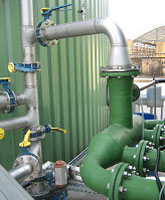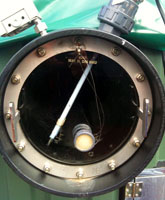Home |
Biogas |
Landfill Gas |
Sewage Gas |
Facility Management |
Partnerships |
Worldwide |
About us |
Contact |
 |
Biogas
Damage caused by undesired components in biogas |
 |
Our combined solutions The dimension of the filter system depends on different parameters such as the quantity of H 2S in raw gas, gas flow, desired degree of cleaning, selected carbon lifetime, product form of activated carbon, temperature etc. The filters can be manufactured in HDPE as well as in stainless steel. To achieve best cleaning efficiency, gas must be as dry as possible before entering the filter chamber. The separation of humidity from the gas is achieved by cooling gas down to its dew point. As carbon is getting its best degree of efficiency at temperatures over 20 °C, the gas must be rewarmed after cooling. This will be effected by a downstream gas warming system. After plant design and construction, we will install all components turnkey on your site, will operate them and perform routine maintenance steps as well as examination of filling and exchange of activated carbon. |
 |
Further technical services In addition to combined solutions against hydrogen sulphide, we offer further services such as :
Consulting and plant management In addition to the already presented solutions, we also take over tasks in the field of plant management such as technical plant management, coordination of different service providers, observation of maintenance schedules and troubleshooting management. We also keep contact to authorities and observe all requirements, laws etc. for you. |
|
Your advantages
|